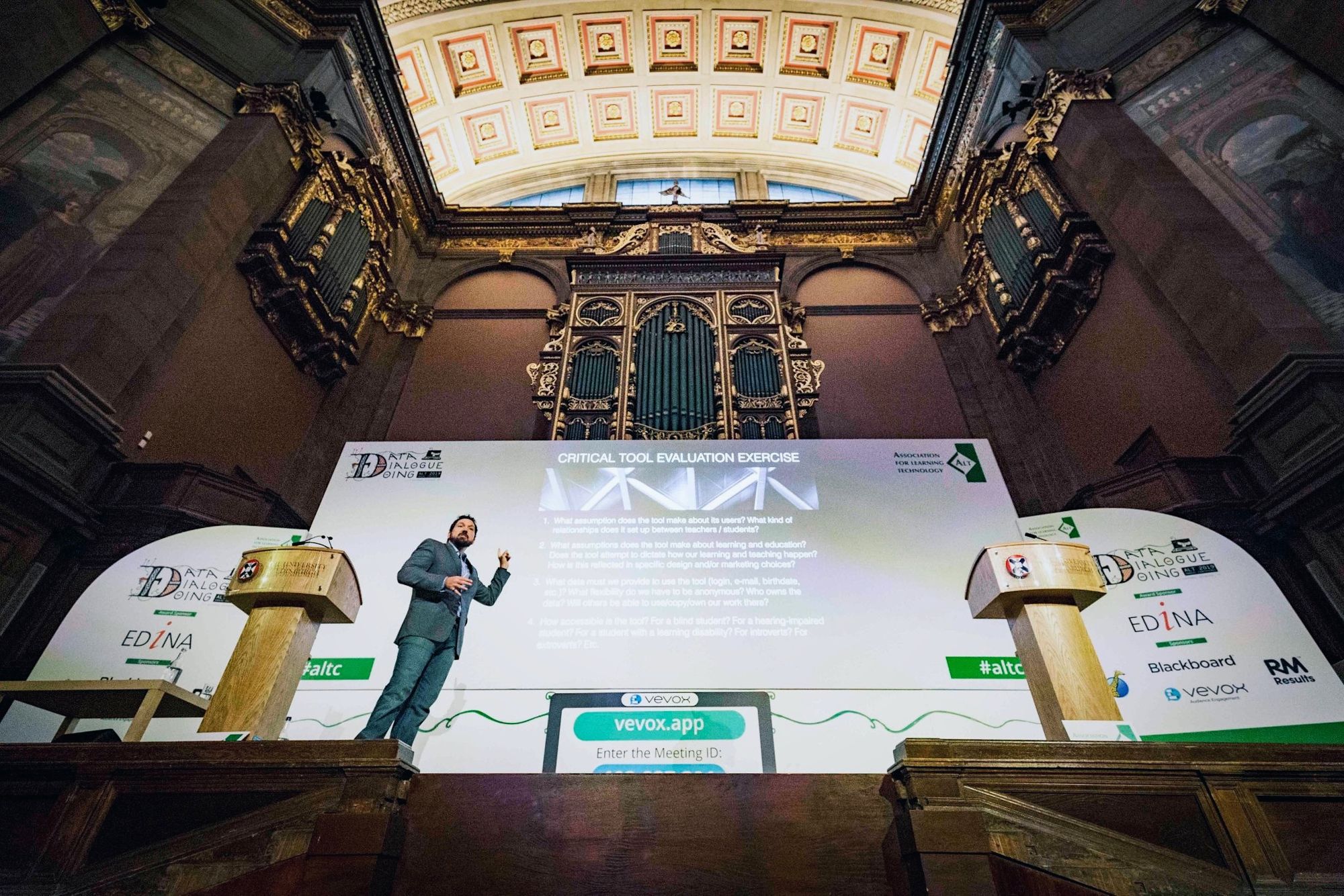
Table of Contents
- Criteria for Evaluation
- Professional Statement
• Teaching
• Service
• Scholarship - CV
- Annual Review Letters
- Artifacts (also woven throughout the Professional Statement)
Criteria for Evaluation
Degree and Education: The guidelines for promotion to Teaching Associate Professor in the Writing Program at University of Denver require that "candidates must have an MA, PhD, or MFA." I received my PhD in English (with an emphasis in humanities and composition pedagogy) from the University of Colorado Boulder in 2010.
Years of Experience: The guidelines require "six years of experience as a Teaching Assistant Professor or equivalent by the time of reappointment and/or promotion." Since graduating, I have worked at the following levels:
2010 - 2011: Postdoctoral Fellow in the Writing Program at Georgia Tech (1.5 years)
2011 - 2013: Assistant Professor and Program Director at Marylhurst University (1.5 years)
2013 - 2015: Assistant Professor at University of Wisconsin-Madison (2.5 years)
2015 - 2019: Teaching Center Director and Instructor (Teaching Assistant Professor equivalent) at University of Mary Washington (4 years)
2019 - 2021: Senior Instructor (Teaching Associate Professor equivalent) at University of Mary Washington (2 years)
2021 - present: Teaching Assistant Professor at University of Denver (2+ years)
Thus, I have 10 years at the Teaching Assistant Professor level and 2 years at the Teaching Associate Professor level prior to this application for promotion at University of Denver. My offer letter from the University of Denver (dated August 12, 2021) states: "You have been granted three years toward your promotion timeline, so will be reviewed for promotion to Teaching Associate Professor in the 3rd year of your contract, 2023-2023."
Quality of Teaching: The guidelines for promotion to Teaching Associate Professor in the Writing Program at University of Denver state that "excellent teaching shall be evaluated based on effective performance based on meeting six of the quality of teaching criteria, including at least one from Section A, as articulated in the Criteria for Reappointment and Promotion." While my dossier provides evidence for nearly all of the criteria, I have chosen to have my teaching evaluated based on:
- quality of course design (from section A)
- quality of interactions in the classroom and in other structured teaching settings (from section A)
- quality of teaching statements, analyses, and reflections
- quality of student evaluations of teaching
- development of teaching methods and materials used by others
- evidence of "teaching teachers" (leading workshops or seminar series for colleagues in the program, elsewhere on campus, or in the profession)
Quality of Service: For the purposes of reviewing my service, I am breaking down the work in the following way:
Shared Governance (5%)
Advancement and Implementation (10%)
Work Equaling Course Reassignment (15%) with a combination of Option A (Additional Advancement and Implementation Contributions) and Option C (Professional Service Project)
Quality of Scholarly and Other Contributions: The guidelines require that "substantive contributions should include at least two of the scholarly and related professional contribution criteria, from any category." In the last 6 years, I have made significant contributions in nearly all categories listed (with evidence included in this dossier). For the purposes of this review, I am focusing especially on these criteria:
- scholarly publication in rhetoric/writing/composition studies
- scholarly publication in other areas
- presentation at conferences, institutes, seminars, etc.
Professional Statement
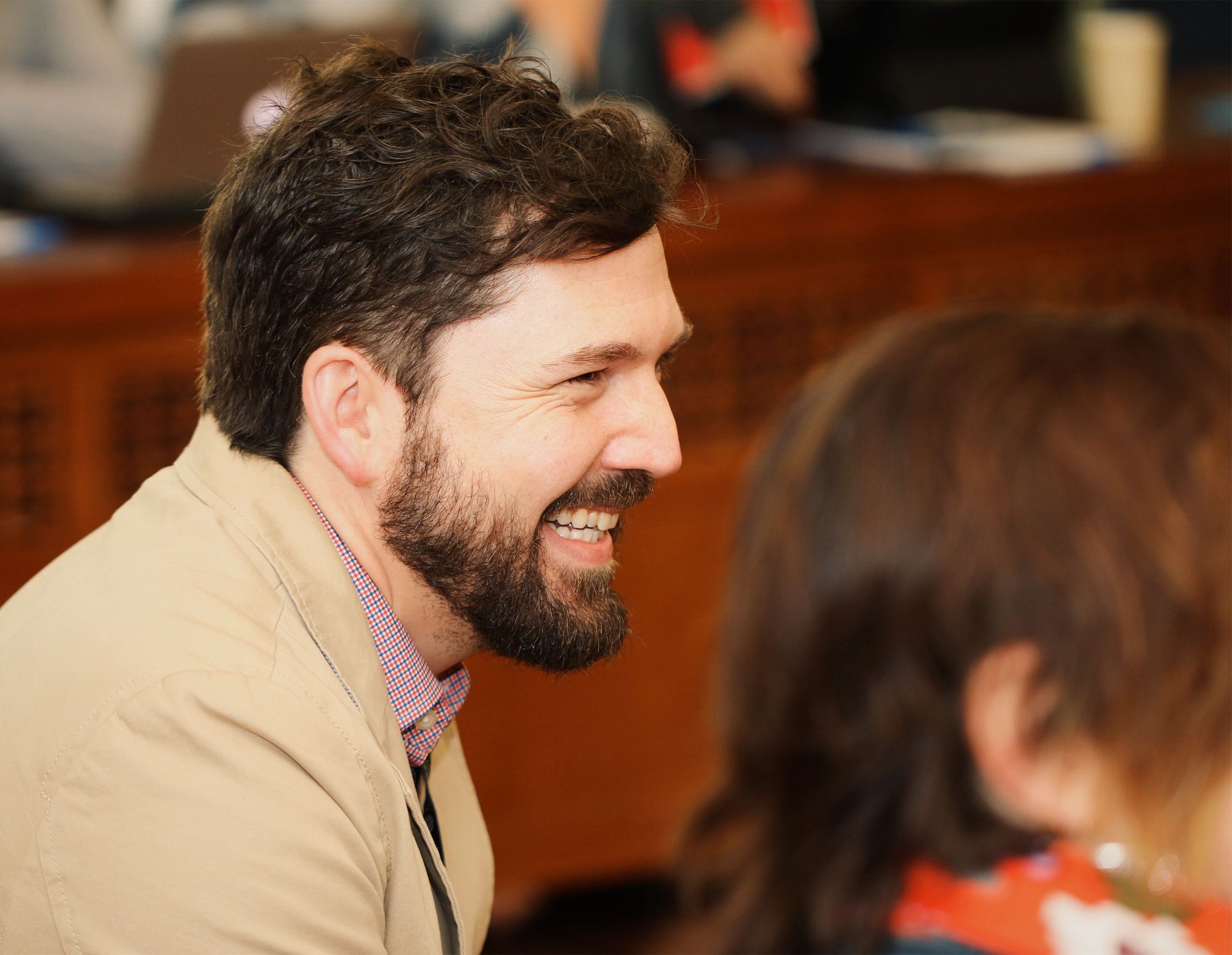
I have been teaching for 23 years. For the first 10 years of my teaching career, I was what I called a "road warrior" adjunct, teaching as many as 9 classes per term at up to 4 different institutions. I have since worked as a program director, an executive director of a teaching and learning center, and as a full-time faculty member at several colleges and universities.
There have been many highlights over the course of my career:
- I have won multiple teaching awards and fellowships
- I've written one monograph, one co-authored book, and two edited collections
- I founded and direct Hybrid Pedagogy, a 501(c)3 non-profit, which offers an academic journal, a book publishing division, and educational outreach
- I launched and co-organize Digital Pedagogy Lab, an international series of online and on-ground conferences, institutes, and seminars
- I've published over 2 dozen peer-reviewed articles and book chapters
- I've given over 50 keynote presentations including at The Teaching Professor Conference, at ASU, at the "Against Surveillance Teach-in," and more
- My scholarship, especially my work in "ungrading" and "critical digital pedagogy," has influenced individual teachers, programs, and entire institutions
- The field of "critical digital pedagogy," which I founded, has spurred the development of several courses and degree programs at multiple institutions
- Since coming to University of Denver, my work has influenced teachers in our program, and I've begun collaborating closely with several other departments and programs
- I have been featured in and interviewed for stories in New Scientist, The New Yorker, The Washington Post, The Chronicle of Higher Education, Chemical & Engineering News, and more
- I have been recognized as an expert and brought in as a collaborator by UNESCO, the United Nations, the Council of Europe, AMICAL, and more
- Finally, and most important to me, my students and their work have been featured at conferences, in scholarly publications, and in popular media
While the whole of my career is relevant, the rest of this portfolio hones in specifically on the 6-year period covered by this review.
I've divided this statement into sections focused on "teaching," "service," and "scholarship," however I see these as deeply interconnected. It is only possible for me to extract them from one another somewhat arbitrarily. While I've done that here, I also draw connections where necessary. As a research faculty member at University of Wisconsin-Madison, my scholarship about teaching was consistently put into the "teaching" bucket. As teaching faculty at several other institutions, that same scholarship about teaching was consistently put into the "scholarship" bucket. While rhetoric and composition as a field generally does see pedagogy as a respected subdiscipline, we still struggle when it comes to deciding how that work "counts," because it doesn't fit neat and tidily into academic schema. A large part of my work as a teacher and as a scholar has been to champion higher education pedagogy both as a subdiscipline of every other discipline and as a discipline in its own right, a locus for teaching, research, and service.
Teaching is a radical act. Supporting the work of teachers is even more radical. It shouldn’t be.
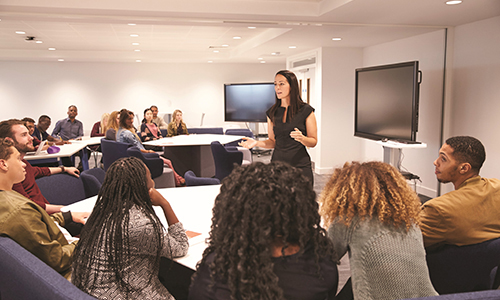
Teaching
In an early draft of my teaching philosophy statement when I first began searching for a full time teaching position, I wrote:
"I hear a small groan as I ask for help rearranging our classroom’s desks into yet another configuration. But moments later the students are eagerly on their feet, the modular carpet tiles buckling as we drag 4-foot conference tables from one end of the room to the other. 'I will be singlehandedly responsible for the destruction of this carpet,' I say, and the room laughs in agreement. Within weeks of the start of each new semester, the students in my classes are fully aware that I’m obsessed with rearranging our classroom: small circular clusters of four and five desks dotting a large room, one large circle of desks around the perimeter, a u-shape facing a projected image. We move frequently between these arrangements and others, often several times in a single class session. I’m also quite fond of the chaotic jumble of bodies and desks that forms when I ask a classroom of students in small groups to abruptly turn their desks to the center of the room. Oddly wonderful things happen when students find themselves in a mass of jumbled desks. It is a profoundly egalitarian configuration."
Those sentences have remained in my teaching philosophy statement to this day, in part because I feel it's important to look back as I look forward – to think about where my teaching began as a way of thinking through where it is headed. At the start of my recent book, Undoing the Grade: Why We Grade, and How to Stop, I write:
"A clear strand throughout the book is that teaching is idiosyncratic and happens differently for different teachers with different students at different institutions. Teaching also works differently for me on different days with different people, across years. Pedagogical thinking is necessarily messy, and so I wanted this book to embody that."
Throughout that book, and all of my writing about pedagogy, I frequently narrate my own journey as a teacher, writing at length about how my work has evolved over time. I do this especially in the chapter, "Compassionate Grading Policies," which offers an account of how my approach to grading and assessment did (and did not) change at the start of and throughout the ongoing pandemic. Almost 20 years into my teaching career at the start of the pandemic, and I made more changes to my approach that year than at any other point. My teaching practice and how I talk about that practice is constantly under reflection, analysis, and revision.

In the several years prior to my coming to University of Denver, I was teaching at University of Mary Washington. Students there are not required to take composition courses. Rather, they fulfill that requirement by taking courses in an array of disciplines that are designated as "writing intensive." Specifically, I taught writing intensive courses in Cinema Studies and Digital Studies. These courses are quite similar to the rhetoric and composition courses I have taught at University of Denver. No matter the discipline I'm teaching, I work to help students develop metacognitive skills, having them write about their own writing, about their own filmmaking, about their own design processes. I also teach multimodal composition, asking students to reflect on how images, moving images, sound, text, and computer code intersect and interact.



I design courses that are flexible, accessible, and offer each student multiple pathways into the work. I present regularly about course design, connecting larger philosophical concerns about access and equity to the design of assignments and other specific choices we make as teachers. In presentations about course design, I offer tenets for "designing for care," which include:
- Flexibility and trust are key principles of any pedagogy, but they are particularly important when we’re in crisis.
- We must be willing to acknowledge trauma members of our community have and will experience.
- Our ability to develop community will depend on our willingness to continue feeling joy, having epiphanies, asking hard questions, and sharing our curiosity with one another.
- Start by Trusting Students.
I am including a letter about my teaching from my long time mentor and co-teacher, R L Widmann, in which she writes,
Watching Jesse in action as a teacher, be it in person or in a hybrid class or online, is a wonderful experience. He draws students into conversation easily and they discuss knotty topics and issues with superb insights and common sense. Jesse Stommel is one of the 3 best teachers I have ever observed.
I have made several videos over the years to document my teaching. I am including two of those here. Each was made using behind the scenes footage shot by students and edited into short films by me. More than just a behind the scenes reel, I do activities like this in my classes as a form of assessment, a metacognitive exercise that helps us examine and reflect upon our learning. For these videos, I asked the students to "document their learning" over the course of the term, and I went through hours of footage, connecting various moments, as a way of making their learning visible and reflecting it back to them.
I consistently score high on course evaluations, both in the years prior to coming to DU, and during my time at DU. Across all of my courses at DU, my median score is a "6" for the questions: "overall, this is an excellent course" and "overall, this is an effective instructor." (Spring 2023 is a slight outlier – this is the first time I taught fully online at DU – but the overall median for those questions remains "6" even with scores for that term factored in.)
My aggregate scores from WRIT 1122 and 1133 during the period between September 2022 - April 2023 were significantly higher than program averages on almost all questions.
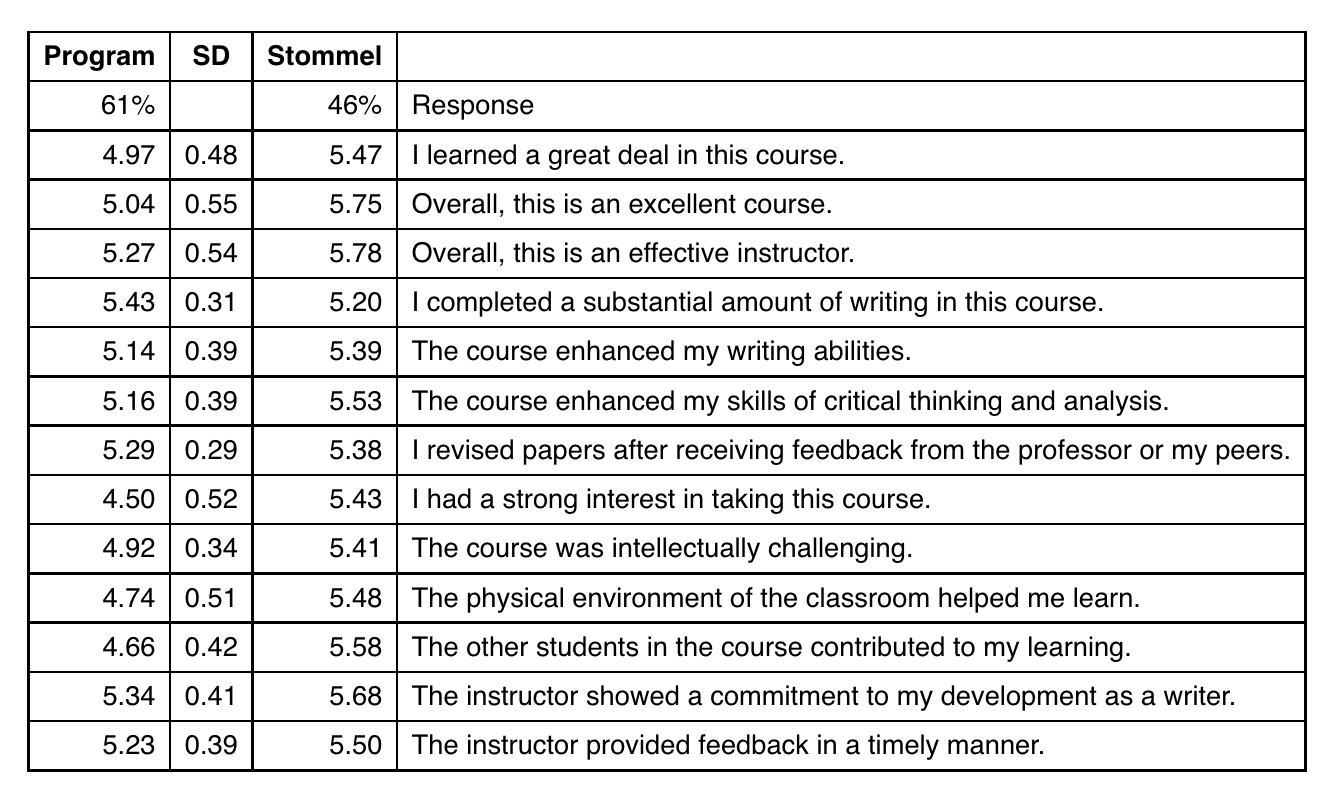
Students have written about me and my teaching:
- "A super awesome professor who allows freedom and creativity. He is great with feedback and answering questions."
- "He makes the class challenging but manageable. He cares deeply about his students' success in the course."
- "Jesse put quite a bit of emphasis on not being restricted to grades or paper lenght. This honestly encouraged me to try techniques out of my wheel house and make a pretty rad final assignment so far. Something I can honestly say I'm proud of making."
- "Jesse is one of the best professors I've had at DU. He really understands students and the stress we are under, and does everything he can to set expectations up front and be flexible when things go wrong."
- "The instructor makes all of the assignments constructive and worth doing. None of the work feels like 'busy work.'"
- "He was very approachable and always understood that we were students and really respects our time and effort. He was always willing to help and made me want to go to class without making me be there. He motivated me to do my work on time and effectively while not making it feel stressful."
I believe teaching is deeply collaborative, so I work to have an impact on students, but I also work to teach and learn from my colleagues. I have heard from several DU Writing Program faculty that my approaches (and scholarship about those approaches) have had a direct influence on their practice. I'm including a letter of support from David Riche, who writes,
One of the ways that Jesse has positively influenced me as both a teacher and a scholar is through his innovative work on “ungrading”—an approach to assessment that invites students and teachers to actively interrogate the (frequently outdated and oppressive) systems underwriting grade-based models. To recalibrate my teaching, I needed a new language of assessment—and Jesse provided it.
I've had an influence on the practice of other teachers at DU beyond the writing program, and I've influenced individual teachers, programs, and entire institutions internationally:
"The 'ungrading' movement, led by author Jesse Stommel, is gaining momentum internationally. Swinburne University recently announced it will remove grades from core aspects of its design degree. Instead it will focus on learning design processes and feedback throughout the semester." (The Conversation)
All of my publications over the last several years have been focused on pedagogy, as have all of my public keynotes and invited talks. While most of these move beyond writing as a field, my work is always rooted there. My aim is to connect my work as a writing scholar, and the research I've done in writing pedagogy, to broader conversations in higher education (and education more broadly), and to take those broader conversations back into my discipline.
In addition to teaching undergraduates at University of Denver, a large part of my work is also to teach teachers. I have done that through national and international presentations, but I have also worked with teachers at University of Denver (which I discuss further in the "service" section of this portfolio). I have offered 27 invited talks or workshops during the 6 year period covered by this review at institutions ranging from Fort Lewis College and Colorado College to University of Warwick in England and Ryerson University in Toronto.
An example of one of those presentations is embedded below, with a link to my workshop notes available at bit.ly/ungrading.
Service
Prior to coming to University of Denver, I participated in service at every level – to the program where I worked, to the discipline, and to higher education more broadly.
Since coming to University of Denver, I have purposefully involved myself in as many committees and projects as possible, helping out wherever I could, while working to more deeply understand the various avenues for service at the institution.
Shared Governance
At my previous institution, I was the Executive Director of the Division of Teaching Technologies and the interim Director of the Center for Teaching and Learning. I was on the Safe Zone Committee, was chair of the Distance and Blended Learning Committee, and I served on the Provost's cabinet.
When I first came to University of Denver, I briefly served on the assessment committee before the group decided to expand the project of the mentoring and professional development committee, which I've been a member of through 2021-22, 2022-23, and now 2023-24.
In 2022-23, I assisted the Conference on Community Writing Ad Hoc committee in their work to devise a hybrid approach to the event.
I served on the Reappointment and Promotion Committee in 2022-23. In Fall of 22, we worked to review a single candidate for promotion, but we also talked at length over multiple meetings about the review process itself with the goal of helping inform the process going forward. In Winter and Spring of 2023, we continued our work to assemble a report (for delivery to the steering committee) about the work of the committee with recommendations.
Throughout my time at University of Denver, I attended retreats and all department meetings, except two, and I completed all surveys, voting, etc. I offered copious suggestions and feedback for all documents under revision.
Advancement and Implementation
My work in this area is at all levels, program, university, discipline, and community work.
Prior to coming to University of Denver, I was a visiting fellow at the Institute for Advanced Teaching and Learning at University of Warwick in 2017. I co-founded Digital Pedagogy Lab in 2015, which hosts faculty development events for educators at all levels. Over the years, since it's formation, DPL has hosted 2-, 3-, and 5-day institutes at University of Wisconsin-Madison, University of Mary Washington, University of Colorado Denver, University of Prince Edward Island, Kwantlen University, American University in Cairo (in collaboration with AMICAL), University of Warwick, Open University, and more.
In 2020, I was published in a special collection released by UNESCO, "Designing for Care: Hybrid Pedagogy in the Time of COVID-19."
In 2021-22, I consulted with the United Nations’ Special Rapporteur on the right to education in advance of a report offered to the UN’s Human Rights Council. I presented at a meeting focused on “Citizenship: what should be the scope of a true digital education?” The group of consultants collaborated on a published report, Policy Insights: The Digitalization of Education.
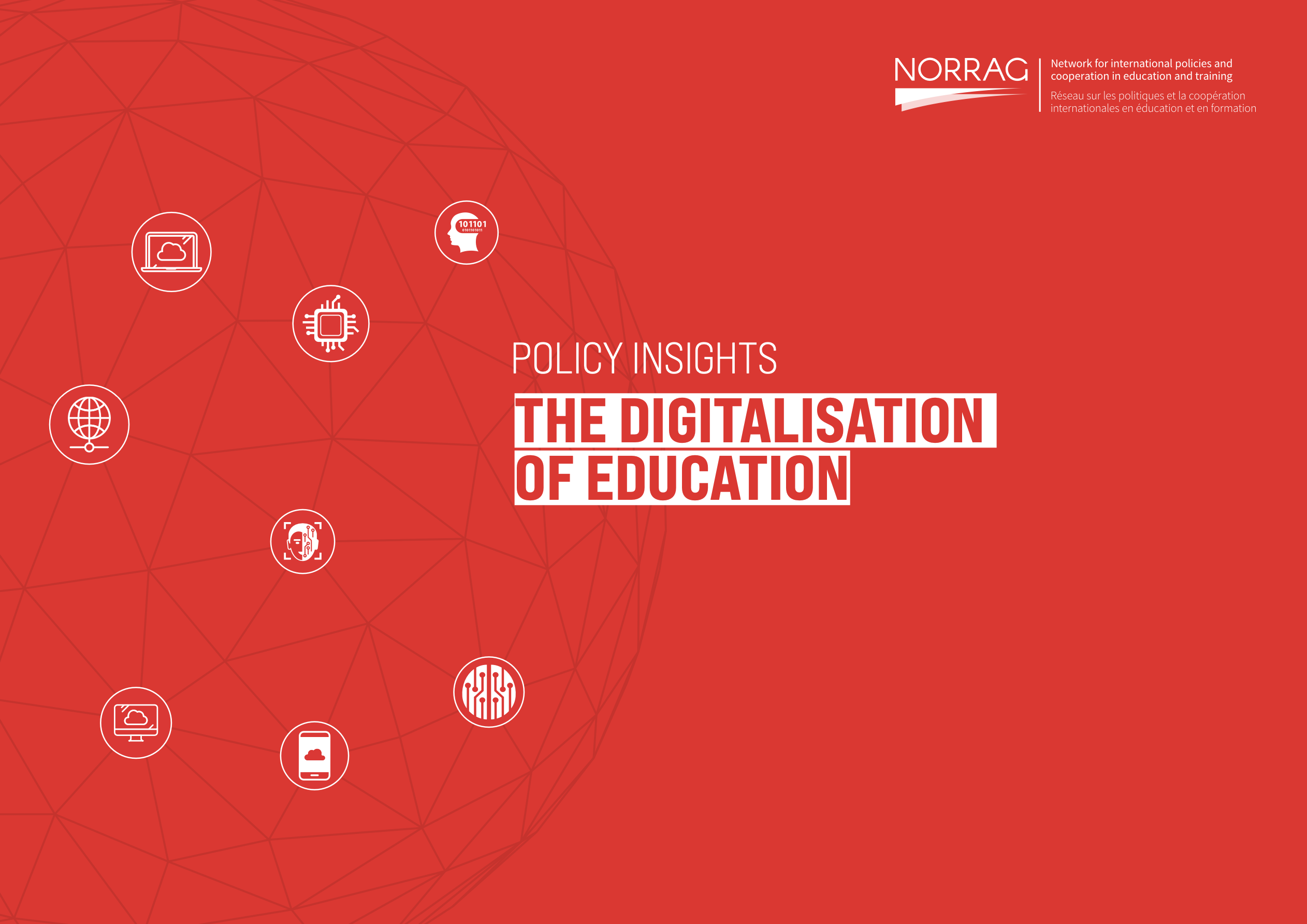
I was affiliate faculty (2020-21) and higher education pedagogy fellow (2021-22) for the Hope Center for College Community and Justice. The Hope Center is an organization at Temple University founded by Sara Goldrick-Rab. The organization is focused on basic needs insecurity among college students. I have helped the organization bridge policy work with pedagogical work. I also served as a coach and mentor to multiple members of their team, who work to educate college staff, faculty, and administrators about basic needs insecurity. While the fellowship was for one year and ended in Summer 2022, I am continuing my work with Sara Goldrick-Rab to co-author and build a multimedia curriculum, The #RealCollege Curriculum, to support institutions across the country. The curriculum is currently being rolled out on a pilot basis, and I'm supporting the writing of additional modules. I have continued to bring this work to University of Denver by presenting about it to colleagues here and connecting it directly to my other work.
In a presentation I offered in July 2020, "Becoming a Student Ready Teacher," I wrote about this work,
The decision to address the lived realities of students is both a compassionate one but also a pedagogical one. It is simply not logical to expect “attention” or “academic success” without at least acknowledging students’ basic needs, especially in the midst of a pandemic which is leaving more and more students in a place of acute trauma.
In a piece for The Chronicle of Higher Education, "Teaching the Students We Have, Not the Students We Wish We Had," I write with Sara Goldrick-Rab,
The work of higher education — as with all of education — has to begin with a deep respect for students. They are not mere data points, not just rows in an online grade book. Students are human first. And so are their teachers.
I joined the Writing Machines: ChatGPT Ad HOC committee toward the beginning of Winter 2023. We have had ongoing discussions and contributed to a conversation at a recent faculty meeting. I have been interviewed about ChatGPT by several mainstream media outlets (including New Scientist and Times Higher Education). I have been glad to find ways to connect my public scholarship and community engagement projects to the work of the program.
Work Equaling Course Reassignment
A huge part of my work in the field, profession, and at DU is as a teacher of teachers. My research is about teaching, I worked previously as the head of a teaching center, I am regularly invited to institutions around the world to work directly with teachers both within my discipline and more broadly. This is my professional service project. It has multiple dimensions:
I am the founder and Executive Director of Hybrid Pedagogy, a 501(c)3 volunteer non-profit organization that runs a peer-reviewed academic journal and does educational outreach activities. In addition to publishing nearly 500 articles by over 250 authors in the last ten years, we have published seven open-access long-form books during the period of this review. I have acted as the publisher for all of these books, was the primary editor for one of them, wrote chapters for three of them, and was author or co-author for two of them. While my individual contributions to this series are included in the scholarship section of this portfolio, my work as executive director and editor for Hybrid Pedagogy is included here.
Since 2017, Hybrid Pedagogy have sold 4770 books (3346 in print and 1424 in ebook formats), with all proceeds supporting the academic and outreach work of the non-profit. All of our books are also available in multiple open-access formats, which have been viewed over 40,000 times. Individual articles on the Hybrid Pedagogy journal are regularly viewed between 200 - 20,000 times with an average of 500-1000 visitors to the journal's site each day. While the scope of Hyrid Pedagogy is broad, the founders (myself and Pete Rorabaugh) and everyone in senior leadership (myself, Christopher R. Friend, and Sean Michael Morris) are all writing, rhetoric, and composition scholars/teachers. I'm including several articles offering more information about the journal and our peer review process:

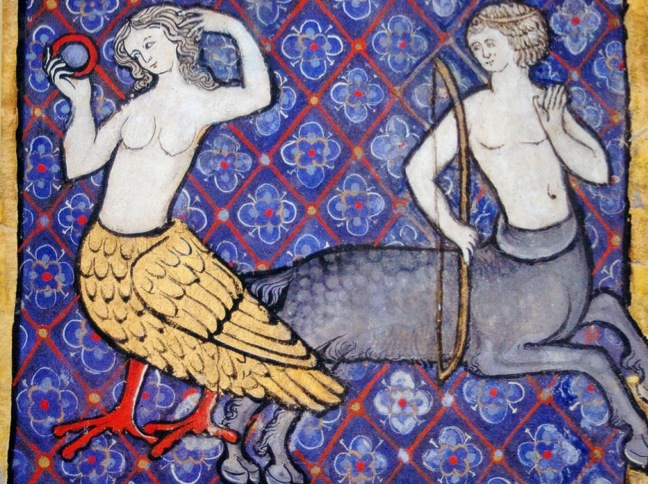

I produce open-access teaching materials that are regularly used by teachers at DU and around the world. My public-facing blog posts, where I write about teaching practices, are regularly read by between 2,000 to 50,000 or more people. While my research listed in the scholarship section is aimed at advancing scholarly conversations, my personal blog is designed as an active resource for teachers, so it fits the definition of service for the purposes of this review.
All of this work connects to, or intersects directly with, my work at University of Denver. As mentioned previously in my teaching section, I have been told by several colleagues that my work and support in this area has transformed their teaching, and that they have mentioned this in their teaching statements included in their annual reviews.
In 2021, I presented about "trauma informed pedagogy" at a Writing Program faculty meeting.
I have consulted with and mentored faculty and graduate students in the Social Work program. I have given guest lectures in that program and led a discussion with a group of faculty and students about grades and assessment. I have been an outside consultant with two Social Work graduate students working on their dissertations.
I have worked to get students from my University of Denver classes included on national panels. For example, two of my students Elizabeth Kandyuk and Claire Eckrich presented (alongside experts in data security and privacy) on a panel at a 2023 educator summit, "Beyond Proctoring: Building Trust in an Online Learning Environment." I work hard to draw students into thinking about pedagogy, lifting the hood on our courses, and working together with them to tinker.
I am currently designing a CFP aimed primarily at University of Denver faculty for a special collection, a series of open-access articles published in Hybrid Pedagogy, but likely collected in a book, as well. I have begun to discuss the project with various faculty and am currently drafting the CFP.
Scholarship
Much of my recent scholarship moves beyond my work in rhetoric and composition and into larger interdisciplinary conversations at the national and international level. However, all of my scholarship is rooted directly in my work as a rhetoric and composition teacher, and I regularly speak and publish alongside other rhetoric and composition scholars. For example, when I present and write about grades and alternative assessment, I draw upon the long history of work in rhetoric and composition about metacognition and self-reflection. A focus on writing about writing, and writing about learning as a process, is at the core of my own research. In my work in higher education pedagogy I speak from my expertise in rhetoric and composition, and I also point larger conversations back toward foundational research in my own fields.
During the period covered by this review:
I have published 13 journal articles or book chapters, including: 2 pieces in Academe: "Care is a Practice; Care is Pedagogical" and "The Human Work of Higher Education Pedagogy."
I have written or edited four books, including two collections, one monograph, and one co-authored book.


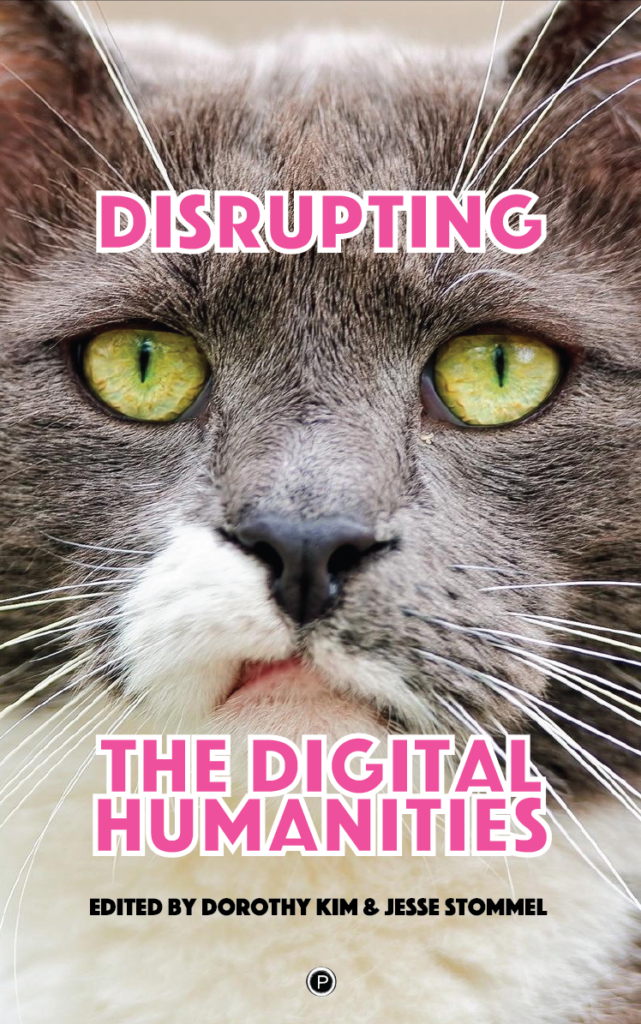

My work has been cited in scholarly publications 940 times, according to Google Scholar, with 752 of those citations since 2018. (h-index of 15)
Interviews with me have appeared in more than 30 mainstream media stories, in venues ranging from The New Yorker, The Washington Post, NBC News, and NPR to PC Magazine and Chemical & Engineering News.
In 2019, me and my work were included in a full-page feature story in the print and online versions of The Chronicle of Higher Education, "Forget Grades and Turnitin. Start Trusting Students."
During the period of this review, I've given 39 keynotes, including a talk offered at ASU ("Designing for Care and Embracing Ungrading"), where I was invited to speak and introduced by rhetoric and composition scholar, Asao B. Inoue.
It's important to me that my work in the field connects directly back to my work for the program – that I am both bringing University of Denver to a broad audience, but that my speaking engagements directly inform my work at University of Denver.
My most recent book, Undoing the Grade: Why We Grade, and How to Stop, was released in August 2023. In just over a month, it has sold over 550 copies, and the open-access version has been viewed nearly 4000 times. I have given 7 podcast and Web interviews about the book, including on the Teaching in Higher Ed podcast and the Future Trends Forum.
CV
An abridged version of my CV is available on my personal Website, and you can click below to download a full version of my CV in PDF format.
Annual Review Letters
Two annual review letters from the University of Denver Writing Program are attached in PDF format. In 2022-23, I "far exceeded" expectations in Teaching, Service, and Scholarship.
Artifacts
The following artifacts are also woven throughout the sections of this site, but a list is included here for convenience. I've organized the artifacts here to show which are being used to support each criteria.
- Letter of offer from University of Denver, showing three years granted toward promotion timeline
Teaching
- Teaching Philosophy Statement (quality of teaching statements, analyses, and reflections)
- "Compassionate Grading Policies" (quality of teaching statements, analyses, and reflections)
- Jay Lewis Broadside, Writing Program Exemplar for Writing in an Alternative Mode (quality of student outcomes)
- WRIT 1133: Indie RPGs (quality of course design)
- WRIT 2650: Digital Rhetorics Syllabus (quality of course design)
- Applied Digital Studies Syllabus (quality of course design)
- "Pedagogies of Care" presentation slides (quality of course design)
- Letter of Support from R L Widmann (quality of interactions in the classroom and in other structured teaching settings)
- Video of composition course (quality of interactions in the classroom and in other structured teaching settings)
- Video of Queer Rhetorics course (quality of interaction in the classroom and in other structured teaching settings)
- Course Evaluations (quality of student evaluations of teaching)
- Aggregate Scores From Course Evaluations (quality of student evaluations of teaching)
- Letter of Support from David Riche (development of teaching methods and materials used by others)
- The Conversation: "Grading students may be as easy as ABC, but evidence shows better ways to improve learning" (development of teaching methods and materials used by others)
- "Ungrading and Alternative Assessment," an invited talk at Western University in London, Ontario (evidence of "teaching teachers")
- "Ungrading: a continuum of possibilities to change assessment and feedback" (evidence of "teaching teachers")
- Ungrading workshop notes (evidence of "teaching teachers")
Service
- UNESCO Publication, "Designing for Care: Hybrid Pedagogy in the Time of COVID-19."
- United Nations Publication: "An Introduction to Critical Digital Pedagogy"
- New Scientist: "Should schools ban ChatGPT or embrace the technology instead?"
- Times Higher Education: "Inside the post-ChatGPT scramble to create AI essay detectors"
- "Becoming a Student Ready Teacher"
- The Chronicle of Higher Education: "Teaching the Students We Have, Not the Students We Wish We Had,"
- "Trauma Informed Pedagogy"
- Hybrid Pedagogy: The Journal of Critical Digital Pedagogy
- "Hybrid Pedagogy, Digital Humanities, and the Future of Academic Publishing"
- "What is Hybrid Pedagogy?"
- "Collaborative Peer Review: Gathering the Academy’s Orphans"
- "Beyond Proctoring: Building Trust in an Online Learning Environment"
- My personal academic blog
Scholarship
- "Care is a Practice; Care is Pedagogical"
- "The Human Work of Higher Education Pedagogy,"
- Undoing the Grade: Why We Grade, and How to Stop
- Jesse Stommel and Sean Michael Morris, An Urgency of Teachers: The Work of Critical Digital Pedagogy
- Jesse Stommel and Dorothy Kim, eds., Disrupting the Digital Humanities
- Jesse Stommel, Chris Friend, and Sean Michael Morris, eds., Critical Digital Pedagogy: A Collection
- The New Yorker: "Is Online Test-Monitoring Here to Stay?"
- The Chronicle of Higher Education: "The Problem With Venting About Your Students"
- The Washington Post: "Cheating-detection companies made millions during the pandemic. Now students are fighting back"
- Chemical & Engineering News: "Chemistry educators try 'ungrading' techniques to help students learn"
- NBC News: "A California high school found students' cellphones too distracting, so they're locking the devices up"
- NPR: “Laptops And Phones In The Classroom: Yea, Nay Or A Third Way?”
- PC Magazine: “2 Years to Get a Humanities Essay Published? Not Anymore”
- Chronicle of Higher Education: "Forget Grades and Turnitin. Start Trusting Students"
- ASU presentation, "Designing for Care and Embracing Ungrading"
- Teaching in Higher Ed: "Undoing the Grade"
- Future Trends Forum: "What is Ungrading?"
- Additional examples of my scholarship during the review period are included in my CV



